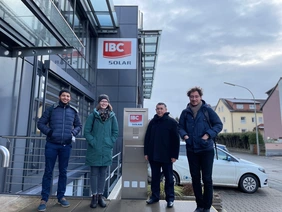During the visit of some researchers of the REMO project to the long-term partner IBC SOLAR AG (IBC) in Bad Staffelstein, one of the topics discussed was the crucial question of what challenges we are facing due to the increasing number of e-vehicles and how this will affect the national energy grid, for example in Germany. In this context, Dieter Miener from IBC highlighted that similar scenarios are also likely for Tunisia if countermeasures are not adopted in time. Furthermore, Dieter Miener introduced the participants to the past and ongoing incentive systems for the promotion of renewable energies in Germany, as the availability of green electricity is also the basis for the planned further expansion of e-mobility in Germany.
In addition to discussing the conditions for a successful transition to e-mobility in the transport sector, the REMO team members also gained a comprehensive insight into the industry partner’s history and fields of work.
The exciting excursion was attended by the Institute of new Energy Systems’ (InES) research associate Karoline Kaiser as well as Prof. Samir Jomaa, Lazher Mejdi and Karem Chatti from the Tunisian partner university ENSTAB, and REMO project manager Philine Ginsberg. IBC is an industry partner of the DAAD project, which is funded by the German Federal Ministry for Economic Cooperation and Development as part of the programme University-Business Partnerships between Universities and Industry in Germany and in developing countries.
Further details on all other international research projects of the Institute of new Energy Systems can be found on the website of InES.



![[Translate to English:] Logo Akkreditierungsrat: Systemakkreditiert](/fileadmin/_processed_/2/8/csm_AR-Siegel_Systemakkreditierung_bc4ea3377d.webp)








![[Translate to English:] Logo IHK Ausbildungsbetrieb 2023](/fileadmin/_processed_/6/0/csm_IHK_Ausbildungsbetrieb_digital_2023_6850f47537.webp)


